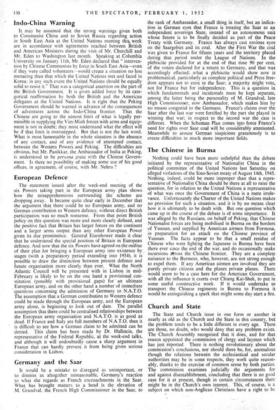Indo-China Warning
It may be assumed that the strong warnings given both to Communist China and to Soviet Russia regarding action in South East Asia at the United Nations meeting this week are in accordance with Agreements reached between British and American Ministers during the visit of Mr. Churchill and Mr. Eden to Washington last month. Speaking at .Columbia University on January 11th, Mr. Eden declared that "interven- tion by Chinese Communists by force in South East Asia—even if they were called volunteers—would create a situation no less menacing than that which the United Nations met and faced in Korea; in any such event the United Nations should be equally solid to resist it." That was a categorical assertion on the part of the British Government. It is given added force by its cate- gorical reaffirmation by both the British and the American delegates at the United Nations. It is right that the Peking Government should be warned in advance of the consequences of adventures across the Indo-China frontier. That the Chinese are going to the utmost limit of what is legally per- missible in supplying the Viet-Minh forces with arms and equip- ment is not in doubt; they must understand what the effect will be if that limit is overstepped. But that is not the last word. What is most lamentable in the whole situation is the absence of any contact, and of any evidence of attempted contact, between the Western Powers and Peking: The difficulties are obvious, but Mr. Panikkar, the Ambassador of India at Peking, is understood to be persona grata with the Chinese Govern- ment. Is there no possibility of making some use of his good _offices, in agreement, of course, with Mr. Nehru ?


































 Previous page
Previous page